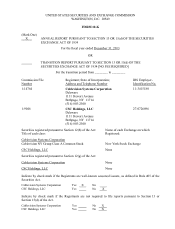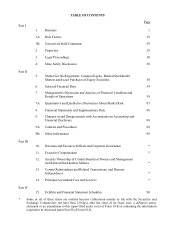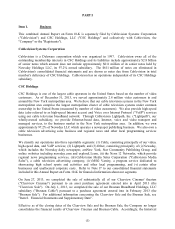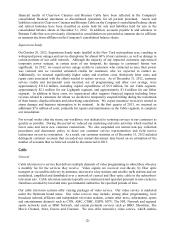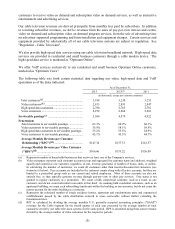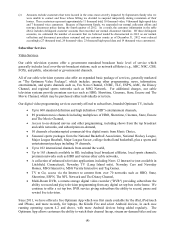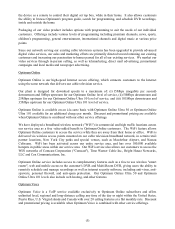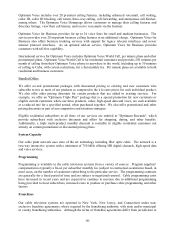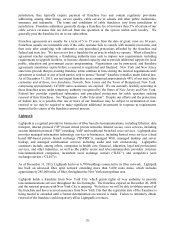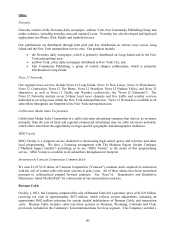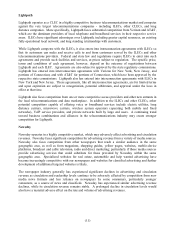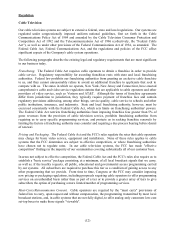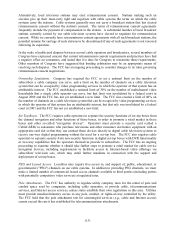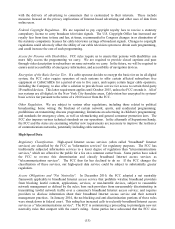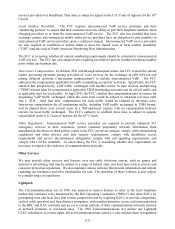Cablevision 2013 Annual Report Download - page 13
Download and view the complete annual report
Please find page 13 of the 2013 Cablevision annual report below. You can navigate through the pages in the report by either clicking on the pages listed below, or by using the keyword search tool below to find specific information within the annual report.
(7)
jurisdiction, they typically require payment of franchise fees and contain regulatory provisions
addressing, among other things, service quality, cable service to schools and other public institutions,
insurance and indemnity. The terms and conditions of cable franchises vary from jurisdiction to
jurisdiction. Franchise authorities generally charge a franchise fee of not more than 5% of certain of our
cable service revenues that are derived from the operation of the system within such locality. We
generally pass the franchise fee on to our subscribers.
Franchise agreements are usually for a term of 5 to 15 years from the date of grant; most are 10 years.
Franchises usually are terminable only if the cable operator fails to comply with material provisions, and
then only after complying with substantive and procedural protections afforded by the franchise and
federal and state law. We have never lost a franchise for an area in which we operate. When a franchise
agreement reaches expiration, a franchising authority may seek to impose new requirements, including
requirements to upgrade facilities, to increase channel capacity and to provide additional support for local
public, education and government access programming. Negotiations can be protracted, and franchise
agreements sometimes expire before a renewal is negotiated and finalized. New York and New Jersey
state laws provide that pre-existing franchise terms continue in force during the renewal negotiations until
agreement is reached or one or both parties seek to pursue "formal" franchise remedies under federal law.
As of December 31, 2013, our ten largest franchise areas comprised approximately 48% of our total video
customers and of those, two franchises, Newark, New Jersey and the Town of Hempstead, New York,
comprising approximately 147,000 video customers, are expired. We are currently lawfully operating in
these franchise areas under temporary authority recognized by the States of New Jersey and New York.
Federal law provides significant substantive and procedural protections for cable operators seeking
renewal of their franchises. See "Regulation - Cable Television". Despite our efforts and the protections
of federal law, it is possible that one or more of our franchises may be subject to termination or non-
renewal or we may be required to make significant additional investments in response to requirements
imposed in the course of the franchise renewal process.
Lightpath
Lightpath is a regional provider to businesses of fiber based telecommunications, including Ethernet, data
transport, internet protocol ("IP") based virtual private networks, Internet access, voice services, including
session initiation protocol ("SIP") trunking, VoIP and traditional Switched voice services. Lightpath also
provides managed information technology services to businesses, including hosted voice services (cloud
based SIP-based private branch exchange ("IP-PBX")), managed WiFi, managed desktop and server
backup, and managed collaboration services including audio and web conferencing. Lightpath's
customers include, among others, companies in health care, financial, education, legal and professional
services, and other industries, as well as the public sector and telecommunication providers (wireless
telecommunication companies, incumbent local exchange carriers ("ILEC"), and competitive local
exchange carriers ("CLEC")).
As of December 31, 2013, Lightpath had over 6,700 buildings connected to its fiber network. Lightpath
has built an advanced fiber optic network extending more than 5,600 route miles, which includes
approximately 285,000 miles of fiber, throughout the New York metropolitan area.
Lightpath holds a franchise from New York City which grants rights of way authority to provide
telecommunications services throughout the five boroughs. The franchise expired on December 20, 2008
and the renewal process with New York City is ongoing. We believe we will be able to obtain renewal of
the franchise and have received assurance from New York City that the expiration date of the franchise is
being treated as extended until a formal determination on renewal is made. Failure to ultimately obtain
renewal of the franchise could negatively affect Lightpath's revenues.


